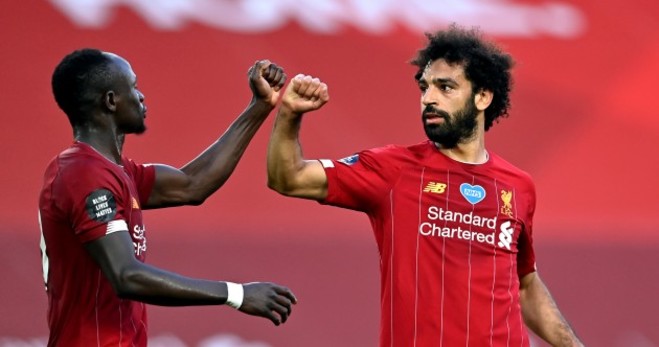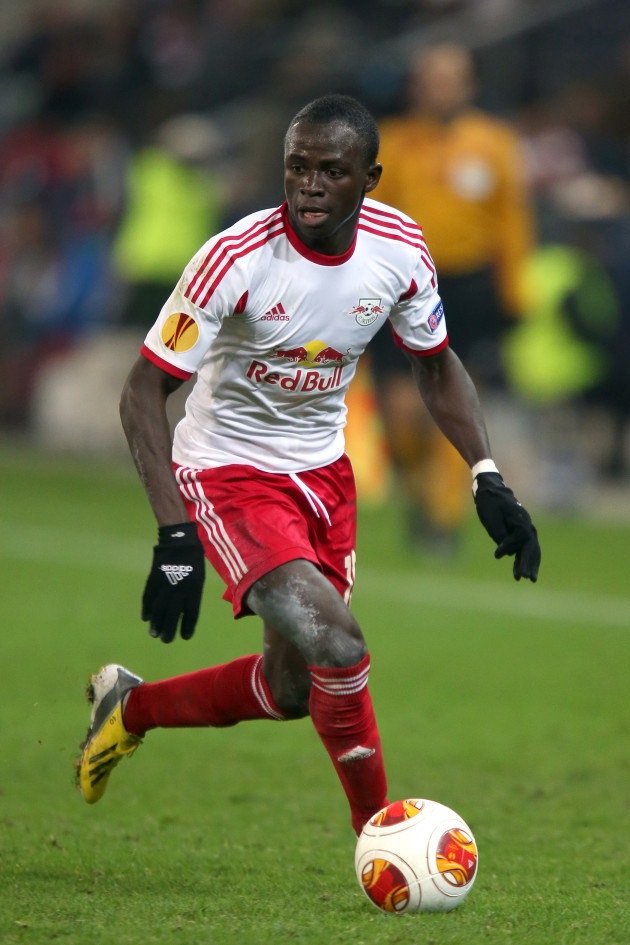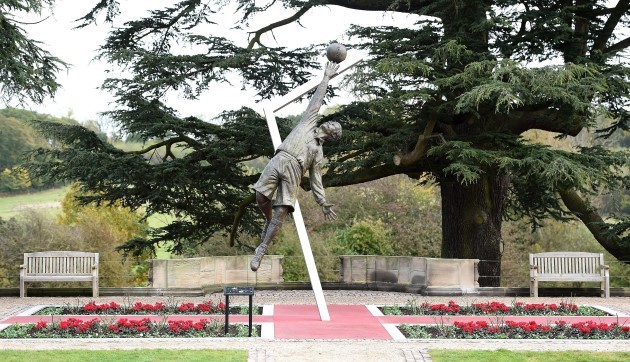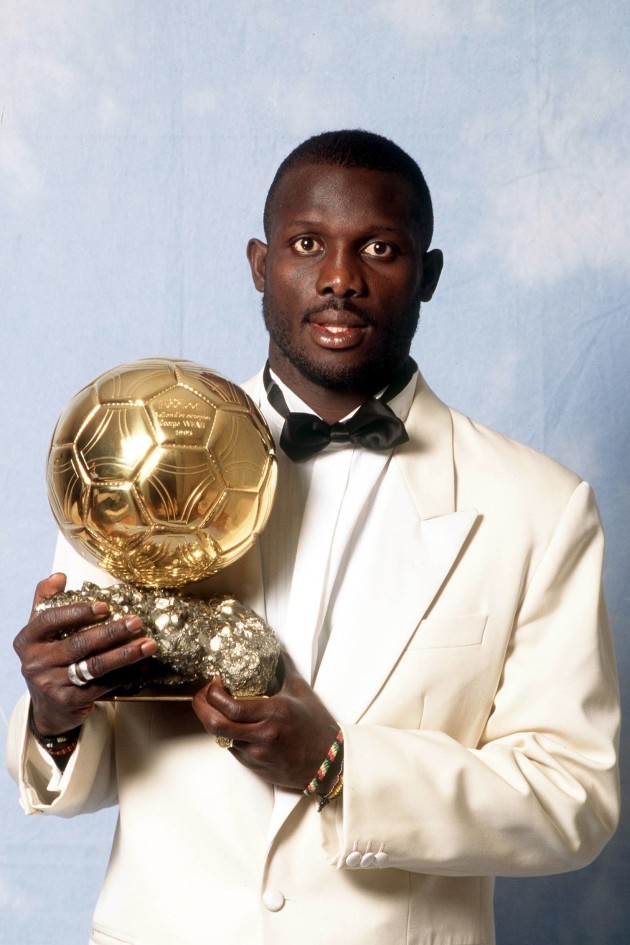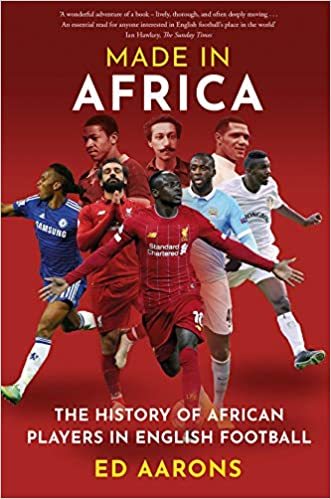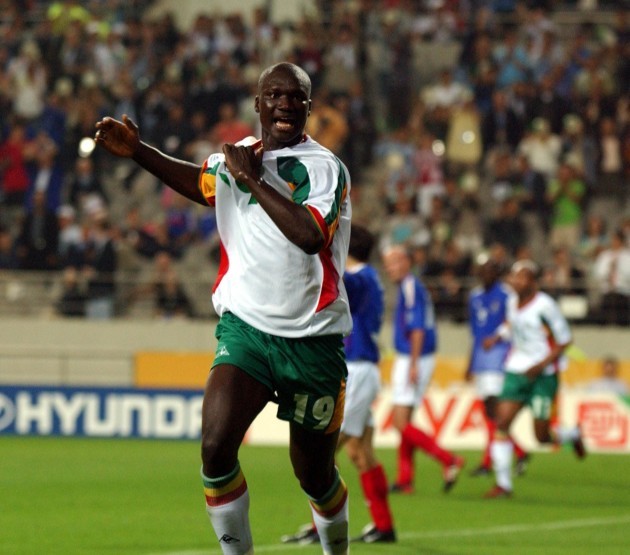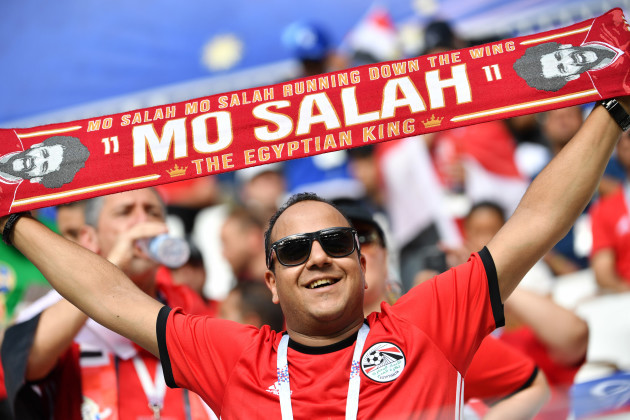THIS WEEK JURGEN Klopp and Sadio Mané were joined together in celebration, the sideline chief and a key architect on the pitch.
Getting their hands on the Premier League trophy realised a long-held ambition, the latest in a relentless sequence of successes together with Liverpool in recent times.
Yet the partnership could have flourished sooner and it could have occurred elsewhere. There was an opening in the days when Klopp was at the helm of Borussia Dortmund as he sought to push his team on in the wake of their 2013 Champions League final loss and Mané was coming off the back of a campaign where he lit up the Austrian Bundesliga, a 19-goal haul proving ample evidence of how instrumental he was in Salzburg landing a domestic double.
Klopp recalls that meeting where a potential transfer was being teased out in Made In Africa, a new book that explores the impact of African players on the English game.
The room was crowded with different parties at the German club when their paths crossed and the manager’s initial judgement was to pass on the opportunity to snap up the Senegalese striker.
“It was this kind of blasé attitude but you could see he was acting a little bit, which is mostly because you are a bit insecure – especially when you are meeting me! He played that role of a cool guy…and ooof. I didn’t get it. Nice fella, obviously. But now I think I really misjudged it.”
Klopp apologises to Dortmund fans for spurning that chance and points to an otherwise largely sparkling transfer record during his tenure at the Westfalenstadion. When he got another chance – when the pair were both operating in England and Klopp witnessed Mané wreaking havoc in Southampton colours – he took it. They have thrived together ever since.
Mané made his move in June 2016 and 12 months later Mo Salah replicated that switch. Salah could have been playing at Anfield at an earlier juncture. In the winter of 2014 he was a hot property after his dazzling displays in the Swiss league but Liverpool’s transfer fee offer was dwarfed by that of Chelsea.
Sascha Empacher, the German agent of Salah at the time, describes the club’s then chief executive Ian Ayre as ‘a complete amateur’ in their negotiations.
Still, after those setbacks the pair joined those that had spurned them, Mané with his manager and Salah with his club. The impact has been remarkable and reflective of a theme in Liverpool’s charge to league glory.
The basis of the modern storyline was Liverpool’s success because it’s just so obvious with Salah and Mane,” outlines Ed Aarons, the author of ‘Made In Africa’.
“Then Naby Keita was tipped to do well but interestingly hasn’t done so well up until now but the last few games I think he’s looked like the player we all expected him to be and he’s looking very exciting for next year. Also you’ve Joel Matip, born and raised in Germany, but he’s a Cameroon international, and Divock Origi is very much of Kenyan heritage. Joe Gomes, his Dad is of African heritage as well I think, so it’s very important to Liverpool’s team ethic I think and the way Klopp moulded together, not just African players, but players from all over the world, is really part of their success story.”
The original pioneers are properly acknowledged here rather than just given a brief mention. It’s more than 130 years since Arthur Wharton became the first African player in English soccer, a statue to him now stands at the FA headquarters at St George’s Park, recognition of his status as an important pioneer of the game.
There are other significant figures afterwards such as Steve Mokone and Albert Johanneson and the remarkable tale of the Stein brothers – Mark, Brian and Ed – from South Africa. There are those more familiar from the Premier League era like Peter Ndlovu, Christoper Wreh, Lucas Radebe and Didier Drogba.
But certainly it seems a subject most salient in the present day. Last season Salah and Mané finished joint top of the Premier League scoring charts with 22 goals apiece, a figure matched by Gabon’s Pierre-Emerick Aubameyang, the continuing shining light in the Arsenal setup who displayed his eye for a goal again last Saturday in a crucial fashion in the FA Cup semi-final.
This year with one round of games left they are all in the top 10 rankings with 20 for Aubameyang, 19 for Salah and 17 for Mané. Algerian Riyad Mahrez joins them in top 20 list with ten goals so far for Manchester City.
On a wider scale there was recognition in the 2019 Ballon D’Or placings with Mané (4th), Salah (5th), Mahrez (10th), Aubameyang (20th) and Napoli’s Senegalese defensive anchor Kalidou Koulibaly in 24th.
But should African players have featured higher?
Alright it’s an award and it’s subjective and everybody’s got their own opinions and stuff like that but it just seems really bizarre there’s only been one African player in the top three,” says Aarons.
“And that’s not just George Weah winning it, he’s the only time anyone’s finished in the top three which just seems odd to me. I’m hoping in the next few years another African player will win it and maybe the whole top three will be African because we’re not that far away from that essentially happening especially with Ronaldo and Messi coming to the end of their amazing careers. They’ve dominated that award.”
In Mané and Salah, there are two flagship names from the continent at the peak of their power. There are striking similarities in the Alpine countries that helped provide the springboards with Mané in the Salzburg ranks and Salah powering the fortunes of FC Basel.
But go back further and there is a contrast in the familial approaches to their burgeoning sporting careers. Mané’s father passed away when he was seven years old. He grew up in a remote village called Bambali in Senegal, 500 miles south of the capital Dakar but removed from the rest of the country by The Gambia.
His family were reluctant to back the pursuit of soccer, instead studies were prioritised, but there is a story told in the book of Mane at the age of 16 having to make a secret early morning trip, with the aid of a childhood friend, to take a long bus ride to Dakar to try out for a team there. When he returned it was clear to his family how serious he was about attempting to embark on the climb to reach the pinnacle of the sport and that set him on the path through the Generation Foot Academy in Senegal to begin to make strides.
Salah comes from the small Egyptian town of Nagrig. As a teenager he was tempted to join an U15 side based in Cairo, a move his father actively encouraged. The travel seemed an obstacle but it was overcome as after initially making the four-hour treks on a daily basis, a coach started to arrange for him to be accommodated at the club’s lodgings to allow for more rest and enable Salah better preparation for the training regime.
They have ploughed on undeterred by setbacks, like Salah’s unsuccessful time with Chelsea, to fulfil their potential.
“Klopp kind of says this, all African players have this story really that it’s not easy,” says Aarons.
“You ask any player that makes it, no matter where you’re from in the world, it’s tough to make, especially at the top level. But I think somebody who’s come from Africa, it’s even harder to make it and most of them have these kind of remarkable stories of coming from real poverty to success.
“It’s not just England, Musa Juwara, the guy from Gambia who scored for Bologna against Inter last season. This is an extreme example but he came in on a dinghy to Italy and then four years later he’s playing in Serie A.
“Most African players in the Premier League have come from extreme poverty, I think that instils in them real desire to make it, that’s hard to beat really if you’ve had that from an early age.”
Recent weeks in this country have seen us delve extensively into the feel-good tales of Italia ’90 and revisit a time that had a transformative impact on the narrative of soccer in Ireland.
It’s not an isolated case. Mané and his generation were similarly entranced by the Senegal team that reached the last eight in 2002, beginning that World Cup with a seismic 1-0 win over the reigning champions France.
“1990 was the epoch for African football. Another quarter-final success and to a football powerhouse that doesn’t mean anything but to Ireland and Cameroon it was showing you could compete with the very best in the world. I think that was really important for Africa as a whole.
“Senegal was a real hotchpotch team in 2002, they’d all worked their way up and got to the World Cup and then beat the champions in the very first match. They’ve taken it much more seriously now and they’re trying to develop these players at home and then send them to Europe. For example, Generation Foot has a connection with Metz.”
The work of those academies is important, the examples of Generation Foot and Diambars in Senegal which have produced hugely effective in providing a springboard for players of real talent. It’s regarded as key in attempting to provide a proper value for African players.
“They’re not really getting their just rewards for producing some really exciting players that are worth millions and millions of pounds, it’s really the European clubs that are cashing in on all that early work that’s been done,” outlines Aarons.
“Somebody like (Wilfred) Ndidi is a good example, he came from Nath Boys in Nigeria to Genk and they developed him for 18 months, very well obviously because it’s a renowned youth academy that’s produced loads of great players.
And they almost made a million pounds a month because that was the profit, they sold him onto Leicester. That just seems a bit unfair to me.
“I think it’s the same process of going to smaller European leagues and then working their way up. Naby Keita went the exact same pathway as Mané via the Red Bull clubs. The important thing to say about this is that once a pathway is established, it becomes like a stream for players and is a lot easier. The scouting that’s what it comes down to, getting earlier and improving infrastructure within Africa.
“England is kind of the final frontier still, the Premier League because of the work permit situation. So a lot of players are kind of forced to take that route, they have to go to a smaller league first like Belgium or Austria and then make the move. But the success of these guys is only going to help, increase the numbers I think.”
In their own way Mané and Salah in particular have been pioneering figures. Aarons travelled to Salah’s Egyptian home when researching the book and discovered, just like Mané in Senegal, how revered these figures are and how appreciated it is that they invest in projects in their communities.
“I met both of them at a very early age at the 2012 Olympics, I was working with the Senegal team a lot, less so with Egypt but got some good access to them then. They were tipped to be superstars, it’s been a really interesting journey following both of their careers very closely since.
The pride of people in Egypt in Salah, he was the first Egyptian to win the Champions League, it’s unbelievable. Everywhere you go he’s the most famous person. And it’s the same in Senegal, the Made In Senegal documentary with Sadio Mané shows him when he goes home.
“I think it gives a lot of people hope actually. That’s the number one thing. It shows them what is a possibility, it’s not just the reserve of people from Europe to win these things. There is a possibility that you can make it. They’re very humble as well, that really helps their popularity. Everybody really respects them and they’re doing amazing things.”
The42 is on Instagram! Tap the button below on your phone to follow us!
